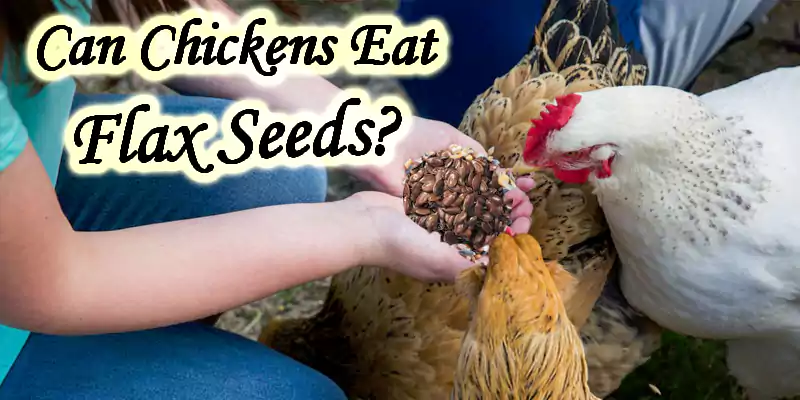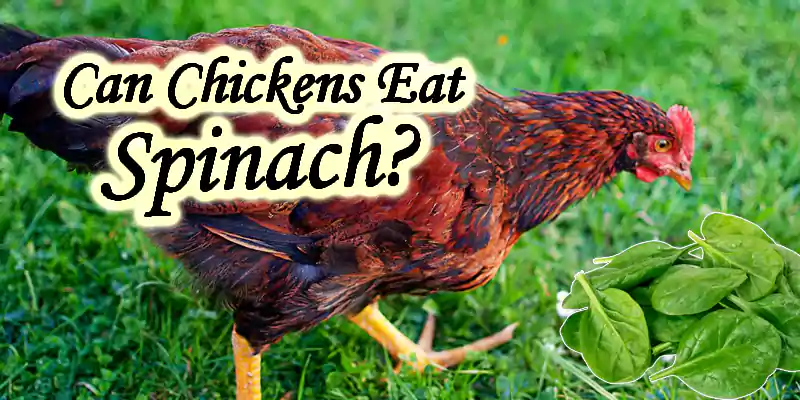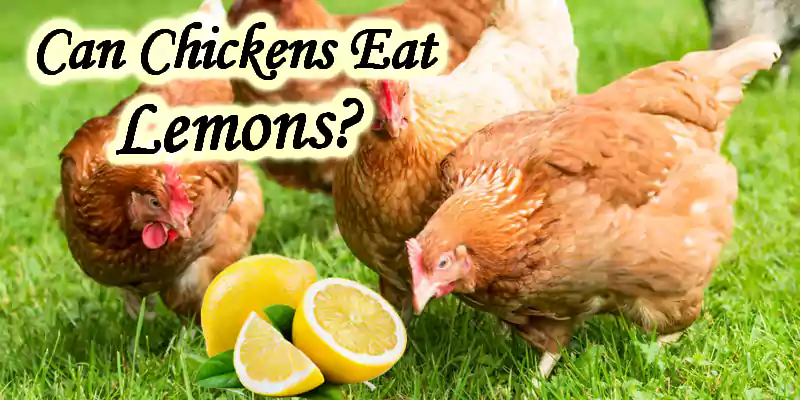Can Chickens Eat Flax Seeds? Unlock Better Eggs & Feathers!
Published: 13 Nov 2024
Poultry owners want to explore new foods to serve a nourishing diet to their clucking friends. Diverse dietary options can easily confuse them, and they are creating buzz nowadays. Flax seeds provide loads of nutrients that support the healthy growth of chickens. Can they safely eat flax seeds?
It is essential to understand how these tiny snacks benefit chicken health, the potential risks to watch out for, and the best ways to incorporate them into chicken meals. Let’s explore the effects of these tiny seeds on the flock.

Can Chickens Eat Flax Seeds? Let’s Understand its Effects
Are Flex Seeds Safe for Chickens?
Yes, they are safe and nutritious if served cautiously. They carry some toxic cyanogenic compounds in large amounts. Additionally, excessive consumption will cause digestive upset. Soak them and feed in limited quantities to make them safer and healthier.
Are Flax Seeds Healthy for Chickens?
Yes, they are healthy for the flock. It provides numerous nutritional benefits. It is essential to serve them as part of their balanced diet. Here are common nutrients available:
Omega-3 Fatty Acids: Omega-3 fatty acids are helpful. Alpha-linolenic acid (ALA) is a beneficial compound for the flock. It is supportive of the heart health. It reduces inflammation and enhances egg quality. These fats are helpful for feather growth and aid immune function.
Fiber Content: They contain both soluble and insoluble fiber. It is beneficial for adequate digestive functions and promotes a healthy gut. It prevents constipation issues. Supportive to bowel movement and improves the quality of droppings.
Lignans: Lignans have antioxidant properties. It helps them to reduce oxidative stress. Lignans support the immune system of clucking champions. These compounds have anticancer properties which are helpful to combat diseases.
Proteins: They provide proteins. It is supportive of muscle growth. It is essential for tissue repair. Protein content is an excellent source to enhance egg production in laying hens. It helps strengthen their bones.
Vitamins: The seeds provide several vitamins. It contains vitamins B1, B6, and E. These nutrients are helpful in a healthy nervous system and improve metabolic function. Vitamins are essential for the overall well-being of backyard flying birds.
Minerals: They contain minerals like magnesium, phosphorous, and manganese. They support the muscle function. Phosphorous is essential for the bone health of the flock. Manganese is a vital mineral that supports metabolism and enzyme activity.
Amino Acids: They have “lysine,” an essential amino acid for protein synthesis and growth. They are considered the building blocks for proteins. It supports egg production and strengthens the body.
How to Feed Flax Seeds to Chickens?
Understanding the appropriate ways to serve them is crucial. Here are some simple steps to safely offer:
- Select the right type of Flax seed: Choosing the appropriate type of flax seed is crucial for healthy flock. Whole flax seeds are not beneficial for them because their hard outer shells can create choking issues.
- Prefer Organic Flax Seeds: Organic version have fewer pesticide residues and chemical compound risks. These harm the chicken’s digestive function and can result in diarrhea and blotting.
- Grinding Flax Seeds: Grinding them will make them easier to digest. Make a fine powder in a general food processor or use a coffee grinder.
- Soak Flax Seeds: Soaking them (like whole seeds) will make the outer shells softer and more easier to consume. It will reduce the toxicity of raw flax seeds. So, always soak them to make it a safe diet.
- Mix with Routine Diet: You can mix them with a routine diet of your flock. After some time, they become familiar with it and start enjoying the taste and flavor of flax seeds. You can mix it with Pumpkin or chia seeds.
- Serve them as a Treat: The safety of your flock must serve the tiny grains as a treat. Overfeeding or excessive intake will ruin the chicken’s health and growth.
- Monitor the Reaction: After feeding soaked seeds to the flock, carefully monitor their response. Look for any health issues. Change the diet schedule according to their interest and acceptance.
- Proper Storage of Flax Seeds: Preserving them in a cool, dry place is mandatory. You have to maintain their freshness and nutritional value. Ground seeds can spoil quickly. So, be careful in their storage.
- Consult with a Veterinarian: Raw flex seeds contain Linamarin compound, which releases a trace amount of cyanide. It can be toxic for your flock. So, identify any toxicity signs and immediately consult with a veterinarian.
Can Baby Chickens Eat Flex Seeds?
We are not in favor of serving them to chicks. Chicks have an immature digestive mechanism and can’t handle such a high-fiber diet. Additionally, the outer shells are complex and can cause choking to chicks. Chicks should not have them till their first two months. After that age, they must be offered a small amount of soaked flax seeds. To fulfill their dietary needs, offer them a commercially formulated diet with balanced nutrients.
Can Chickens Eat Flax Seeds Everyday?
No, they can’t consume them daily. We have recommended soaked flax seeds as an occasional diet for the flock. Daily or excessive intake will cause digestive issues. Additionally, a higher volume can result in a nutritional deficiency. Providing a well-nutrient diet is our prime focus which will be ruined. So, never overdo it.
Can Chickens Eat Whole Flax Seeds?
No, they should not be offered whole flax seeds for various reasons. Their outer shells are hard and can cause choking issues. It is difficult for them to consume these hard seeds. Additionally, their nutritional value is meager, which can affect the growth of your flock. Overnight soaking the whole seeds can make them safer and easier to consume for the flock.
Can Chickens Eat Ground Flax Seeds?
Yes, they can safely consume ground flax seeds. We preferred this format over whole seeds. Grinding will help them to digest and take maximum nutritional benefits easily. You can mix them with other diet to make it more soothing. It would help to properly store ground seeds in a cool and dry place to make your chickens happy and healthy. We recommend its occasional intake. So, ensure moderation.
Can Chickens Eat Milled Flex Seeds?
Yes, they can have milled flax seeds in moderation with caution. Making fine powder is an excellent tactic to make things easier for the flock. You can take maximum nutritional benefits from them and mix the seed powder with another diet normally served to your flock. It will diversify the diet plan of your flock, and they will feel happier. You must follow the moderation rule.
Can Chickens Eat Flex Seeds in Water?
Yes, they can have them soaked in the water. We prefer soaked flaxseeds for the flock. The soaking process will soften the texture of seeds and make them easier to digest for the flock. Additionally, it will help to neutralize the toxicity of cyanide. We suggest soaking them for a few hours or overnight for better results. Serve soaked seeds in moderation to ensure their safety and growth.
Benefits of Flax Seeds for Chickens
We have learned about the nutritional content of flax seeds. Each of the nutrients has some health benefits for them. Here are some benefits:
|
Potential Drawbacks of Flax Seeds for Chickens
It is vital to identify the negative impact of any diet and take some remedial actions accordingly. Here are some potential disadvantages to look out:
|
Alternatives to Flax Seeds for Chickens
Several healthy foods are available with the same or better nutritional value than flax seeds. Here are some nutritious and safe dietary options.
Chia Seeds: Chia seeds contain omega-3 fatty acids, fiber, and antioxidants. These nutrients are highly beneficial for their overall well-being. It has more volume of protein content than flax seeds. Chia seeds are tiny compared to flax seeds and easier to consume
Hemp Seeds: They are more nutritious than flax seeds. Hemp seeds offer omega-3 and omega-6 fatty acids with additional fats and proteins. They are known for a high volume of amino acids. Hemp seeds might be more expensive.
Sunflower Seeds: They are nutrient-rich and safe for the flock. Sunflower seeds offer proteins, fiber, fats, and vitamin E. Shelled sunflower seeds are safe and healthy for the flock. Due to high-fat saturation, serve them in moderation.
Pumpkin Seeds: These tiny seeds are nutritious and safe if served in moderation. Pumpkin seeds provide fats, iron, zinc, magnesium, and antioxidants. They are supportive of digestion process. Serve the seeds in raw or roasted form.
Oats: Carbohydrates are essential nutrients for their healthy growth, and Oats provide loads of carbs. Oats also offer fiber which aids digestion. It has a lower volume of dietary fats, which supports weight balance.
Sesame Seeds: They are full of healthy nutrients like iron, calcium, magnesium, proteins, and fats. Sesame seeds are safe in moderation. Poultry experts recommend sesame seeds for egg-laying hens due to their calcium content.
Conclusion
We have concluded that chickens can eat flax seeds in moderation. Raw flax seeds have more potential risks for them and are not recommended. We recommend soaked or ground version in moderation for the flock. Some cyanogenic compounds that release cyanide content are present in flax seeds. The overnight soaking will reduce the toxicity and soften their texture.
We have suggested an occasional intake for the flock. Excessive consumption will have many adverse effects on chickens. So, cautiously serve ground or soaked flax seeds to your flock in moderation.

- Be Respectful
- Stay Relevant
- Stay Positive
- True Feedback
- Encourage Discussion
- Avoid Spamming
- No Fake News
- Don't Copy-Paste
- No Personal Attacks

- Be Respectful
- Stay Relevant
- Stay Positive
- True Feedback
- Encourage Discussion
- Avoid Spamming
- No Fake News
- Don't Copy-Paste
- No Personal Attacks


